News
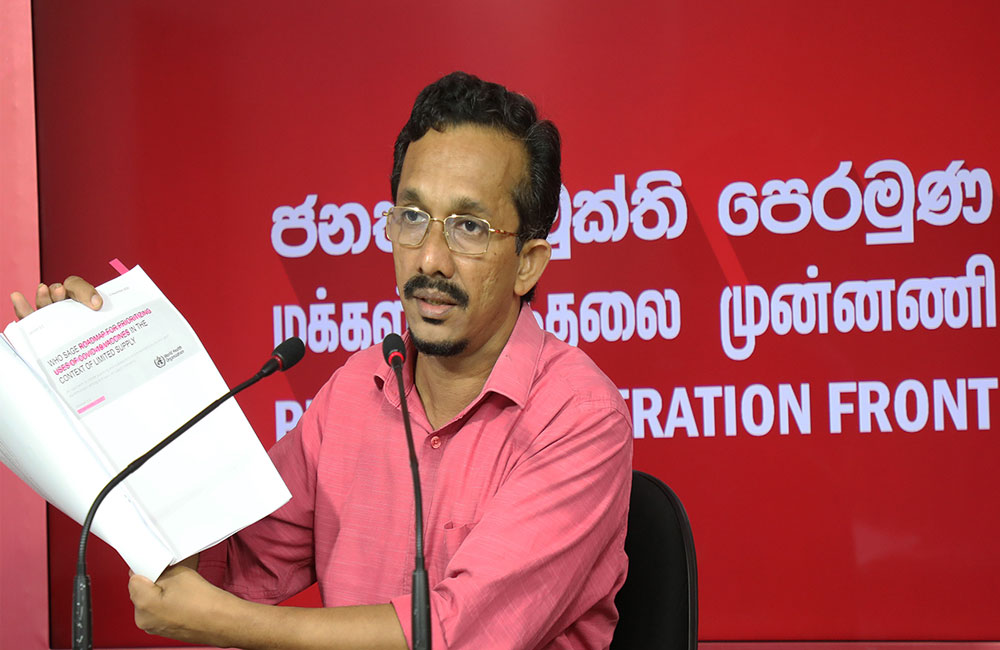
Govt. manipulates data; hides truth from people : Hadunnetti
The Janatha Vimukthi Peramuna (JVP) today alleged that the Government was manipulating data and information on the Covid-19 pandemic violating the people’s right to know the true situation of the pandemic.
Former JVP MP Sunil Hadunnetti told a news conference that it was vital for the people and decision making bodies to know the true data and information on the pandemic situation.
He said it was reported that there was a contradiction in the data and information issued by the Covid Task Force and the Provincial Directors of the Health Services and pointed out that it was a serious matter.
“It was reported that there was a contradiction of the data on Covid patients in the Gampaha District. We doubt the statistics on the Covid mortality was also twisted,” he said.
Hadunnetti said the Covid Task Force was getting data through the Health Ministry and added that it was either the Director General of Health Services or Head of the Covid Task Force was releasing the incorrect information.
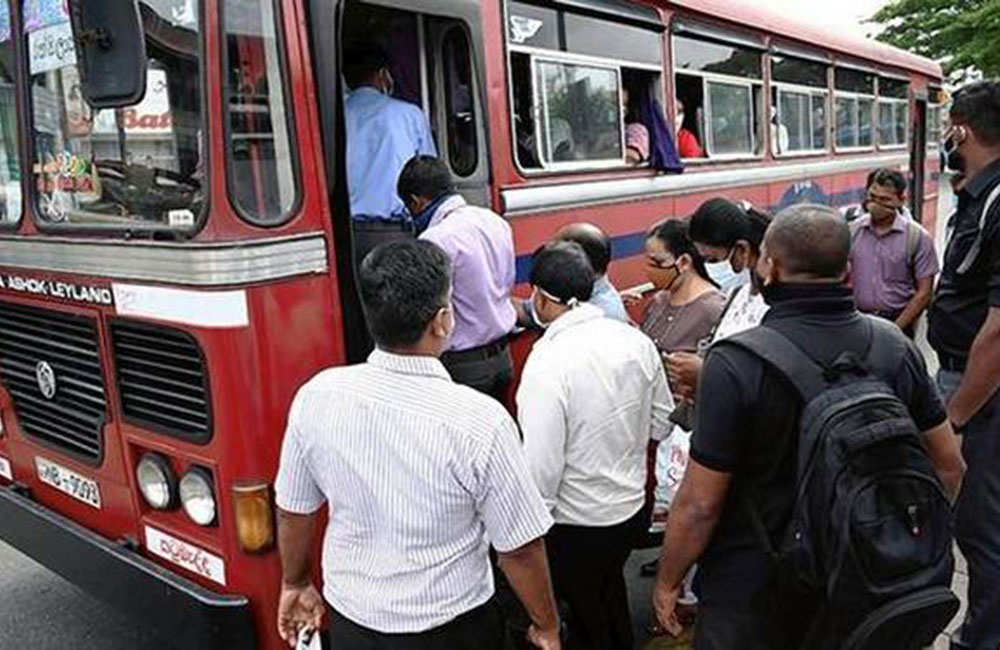
AMS urges Government to revisit Covid-19 protocols amid rapid spread of Delta variant
Health experts have warned Sri Lanka of an impending COVID-19 Delta variant outbreak in the coming months if the public fails to take necessary precautions and if they are not fully vaccinated.
With the delta variant being commonly detected, the number of patients and more disturbingly, the exponential rise in the number of oxygen dependent patients, the capacity to accommodate them has virtually reached its tipping point, the Association of Medical Specialists (AMS) said.
As the demand for oxygen increases, The AMS observed that it will only take a few days to exceed the supply which will increase deaths due to lack of oxygen or more importantly, due to the lack of oxygen delivery mechanism to the patient's bedside, adding that the crisis will be equally applicable to both public and private sectors.
"In this backdrop, further relaxation of Covid restrictions in our opinion will be adding "fuel to the fire". With such relaxations reaching the general public, who are already complacent in obeying guidelines, will invariably start behaving like "free birds" aggravating the crisis further.
We, as a professional body feel it is our prime responsibility to alert and warn the decision makers of the current grim situation. In our opinion, relaxation should have commenced once we've achieved vaccination targets along with a declining number of Covid 19 daily cases, maybe in four to eight weeks from now.
With declining economic performance indicators, we are quite aware of the urgency the government has in getting the economy back on track. However, impatient and hurried decisions to open the country up will invariably delay any expected economic growth due to surging Covid 19 related mortality and morbidity.
As medical specialists, we strongly believe that economists and others have to be alive in the first place to develop the economy and no tourist will come to our country unless and until we are a reasonably safe place with regards to the current pandemic.
We are quite disappointed and saddened by the silence of professionals who act in advisory and advocacy capacity for lack of courage to inform the decision makers of the TRUTH and REALITIES of the ground situation. We are almost certain that these advisors are very well aware of the current grim situation in the health sector.
Therefore, we are compelled to request the government to revisit their Covid-19 restriction protocols in the wake of surging numbers, especially with this deadly delta variant.
As scientific, practical and pragmatic professionals, we strongly believe that we have to have an intact nation to revive the economy.
We certainly understand the importance of livelihoods provided the lives are saved. We wish to conclude with a well-known medical quote- It is better to have a living problem than a dead certainty."
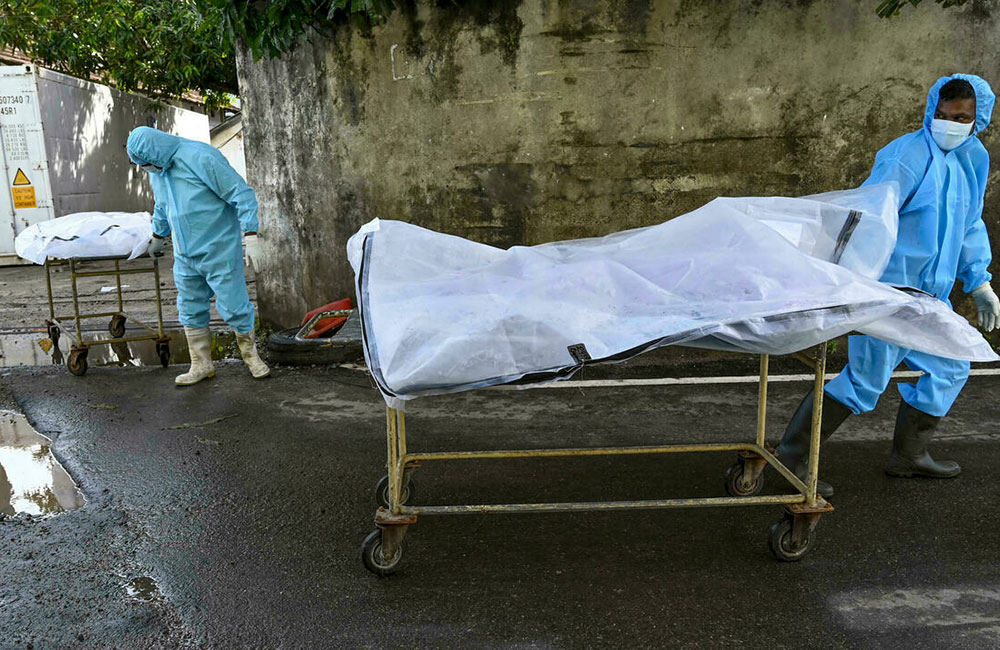
156 COVID-19 Deaths confirmed for Wednesday (11)
A total of 156 more COVID-19 related deaths that occurred yesterday (11) were confirmed by the Director-General of Health Services today pushing the death toll to 5,620.
According to the Government Information Department,69 females and 87 males are among the deceased.
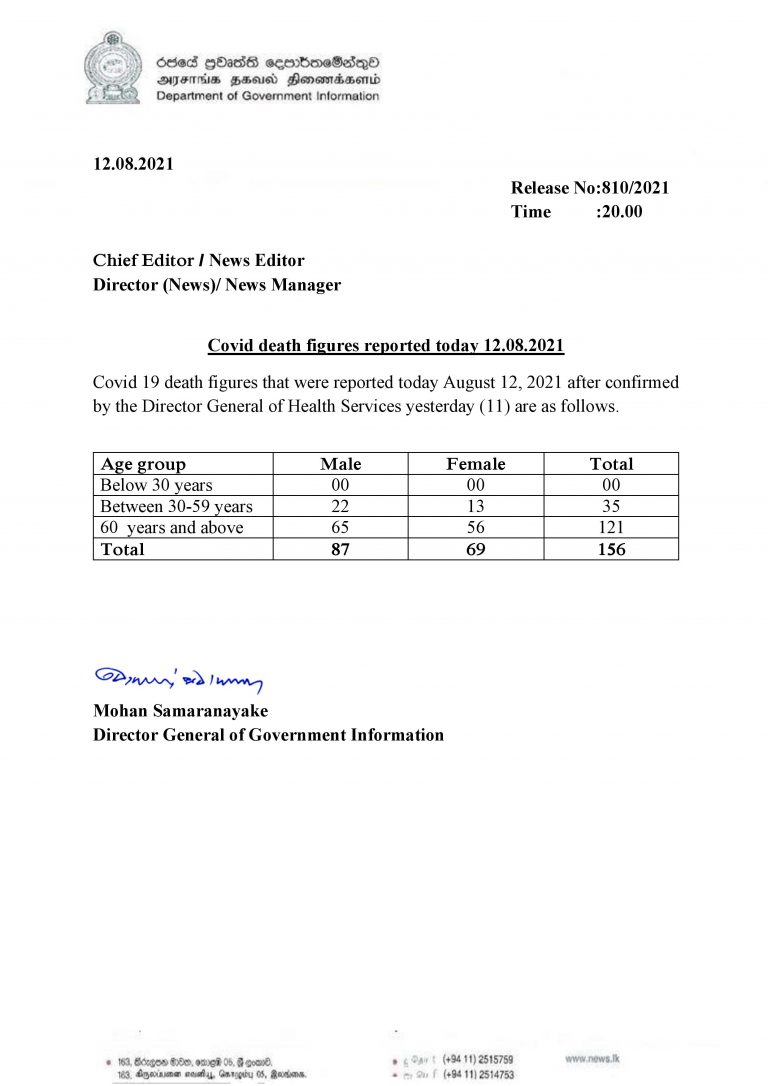
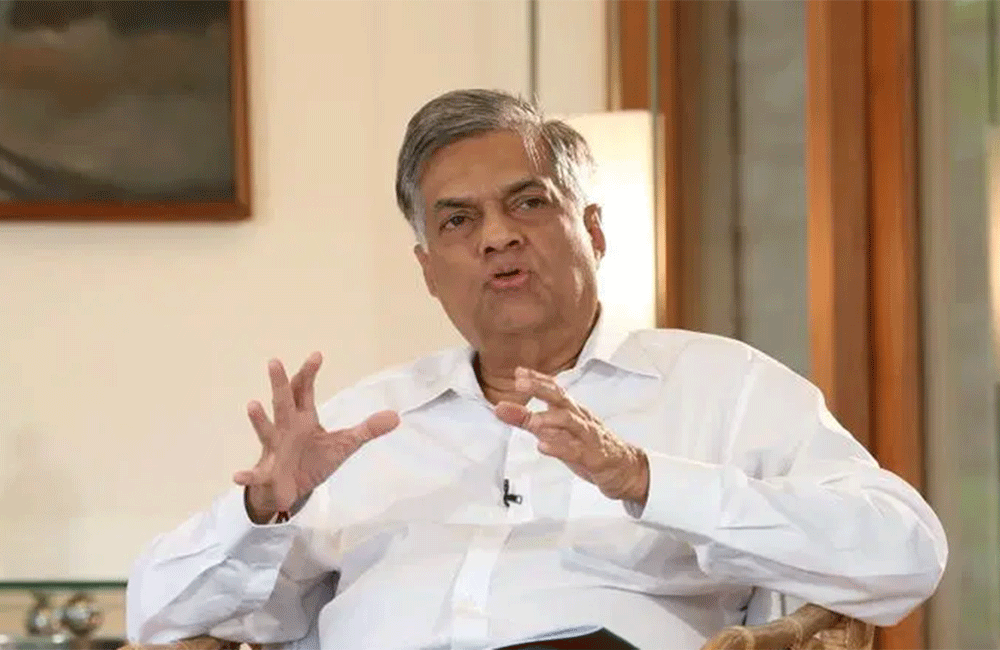
Ranil goes to court over PCoI recommendations
The petition filed through Attorney-at-Law Dinesh Vidanapathirana has named retired Supreme Court Judge Upali Abeyratne, the Chairman of the PCoI as well as other members of the Commission, including the Secretary to the Commission and the Secretary to the President, Dr. P. B. Jayasundera
The former Premier in his petition said there were reports that the respondents had conducted an investigation into the Anti-Corruption Secretariat which was functioning during the period of good governance and he was made aware by the media reports that the Commission had made several recommendations that would affect him as well.
Wickremesinghe pointed out that the Commission had not filed any charge sheet against him during the investigations and he had not been adequately questioned.
He further noted that the Anti-Corruption Secretariat was established in accordance with a decision taken by the Cabinet at that time and that all its expenditure has been made in accordance with the law.
The UNP leader has accused the Commission of Inquiry of conducting investigations against the law and in violation of the legal principle of natural justice and has pointed out that he is being prejudiced by the recommendations made by the Commission.
Accordingly, Wickremasinghe has further requested the Court of Appeal to issue a writ order to invalidate the recommendation issued by the Commission against him and to issue an interim order preventing the implementation of those recommendations until a final decision is pronounced after hearing this petition.
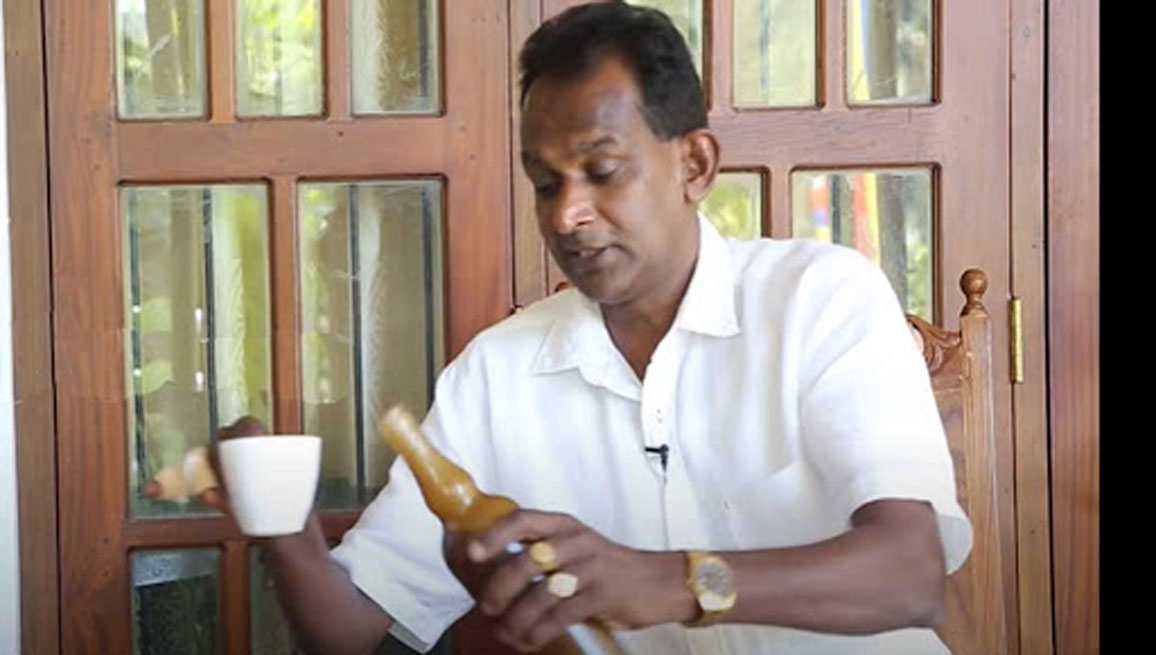
Dhammika Paniya No more – License Revoked
The temporary license issued for the production of the so-called “Miracle COVID Tonic” known as Dhammika Paniya has been revoked.
Dr. Dhammika Abeygunawardena, Commissioner of Ayurveda of the Department of Ayurveda confirmed this speaking at a press briefing to apprise the public of the Ayurvedic treatment given for COVID-19 on Wednesday (11).
“As of now, 14 medicines have been given recommendations and legalized,” he said.
“We had given a temporary license to the Ayurvedic medicine you mentioned but it did not pass the clinical trials” the commissioner added in response to a question.
According to the Commissioner of Ayurveda “the temporary license issued for that product was revoked”.
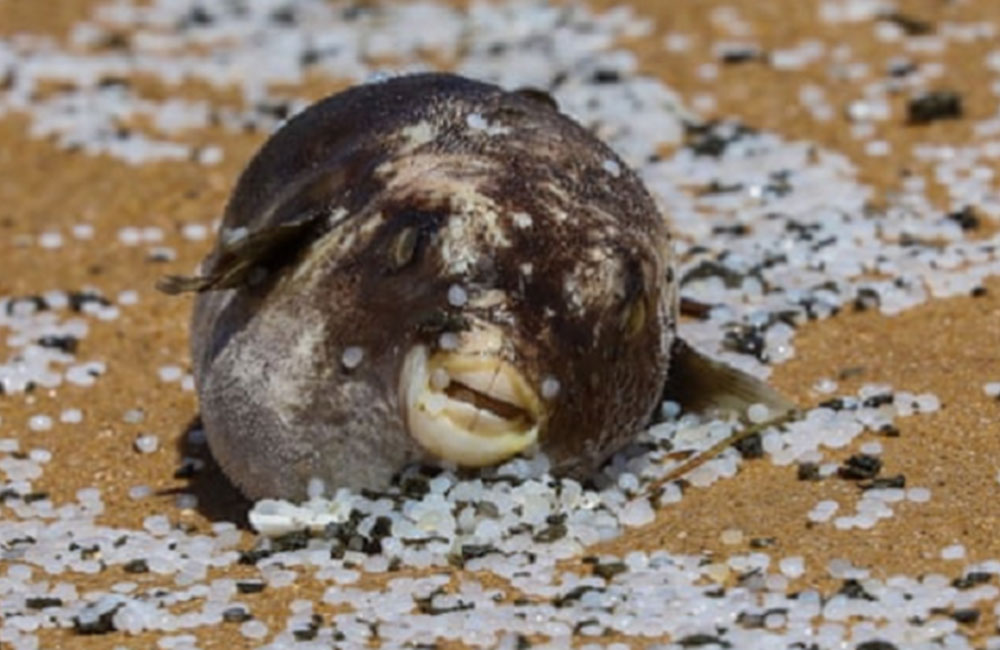
Government using compensation for burnt ship “to create divisions”
He claimed that the country’s highest Catholic leadership is also involved in this divisive act.
“The government is implementing an exceedingly unfair plan which is aimed at creating disputes among and dividing the fisheries community and breaking their backbone.”
All Ceylon Fisherfolk Trade Union (ACFTU) President Aruna Roshantha levelled this allegation while speaking to journalists after lodging a complaint with the Human Rights Commission of Sri Lanka (HRCSL) on Wednesday (28).
According to him, out of Rs 720 million received by the Sri Lankan government as compensation for the damages caused by the X-Press Pearl ship, a sum of Rs 420 million has been allocated for the fisheries community.
Expressing displeasure over not including fishermen in the committee appointed to take decisions regarding paying compensation to fishermen, Roshantha pointed out that the government has arrived at an unfair decision to pay compensation based on the fishing methods.
“Rafters receive Rs 15,000 for 10 days, and boats that land fish by nets receive Rs 80,000. We want to know what is the difference between these fishermen and those fishermen.”
Fishermen are being compensated because they have lost their occupation, Roshantha said, emphasising that there should be no discriminationa as small-scale or large-scale fishermen.
“How are they going to pay compensation like this? What right do they have to take decisions about our lives in this manner? We urge the government to take steps to rectify this mistake immediately.”
Ruler and preacher
According to Roshantha, the committee that decides on compensation comprises representatives of the government and Cardinal Malcolm Ranjith.
“Negombo District Fisheries Association is an organisation run by the government, and its Gampaha district president is not a fisherman. Also, its president is the fisheries minister.”
On 3 June, MV XPress Pearl owned by a Singapore-based company, caught fire while it was in the Sri Lankan waters awaiting clearance to the Colombo Port.
Shortly after, Negombo Citizens’ Collective issued a statement which read that an indescribable environmental damage was happening due to the chemicals that had been stored in the containers the ship was carrying, which are harmful to the environment, human lives and marine species, as well as the debris the incident created.
The prohibition imposed in several areas, such as the 16 km area from the place where the ship caught fire, 6 km area from Negombo to Kochchi Kade, and 2 km towards Panaura, is still in effect, Roshantha said. He had said at an earlier press briefing “in most cases, navy officers chase away fishermen”.
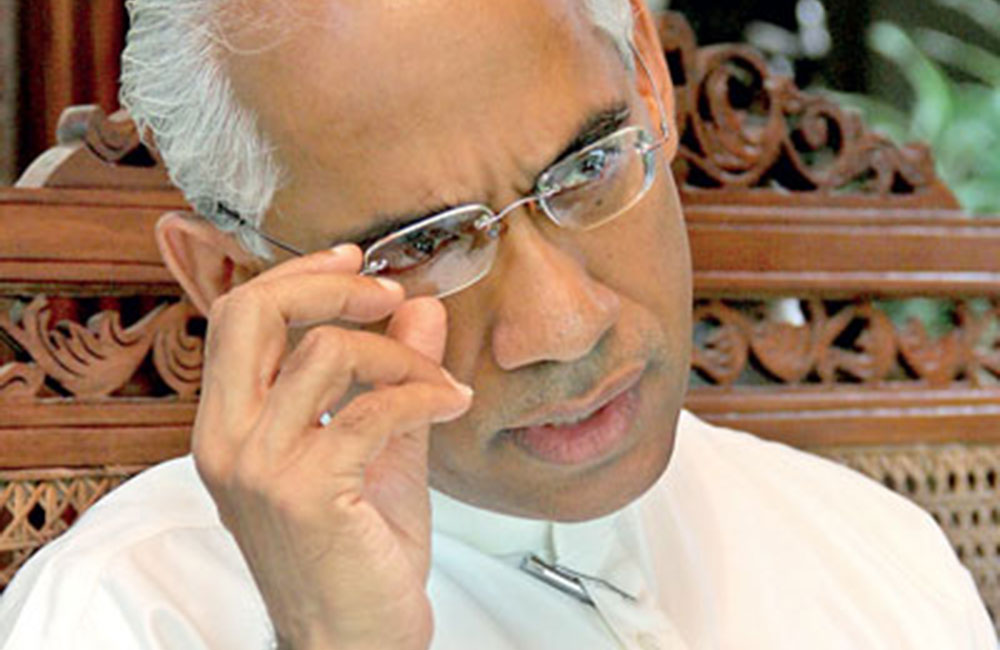
Change the doctor, not the medication - Eran Wickramaratne
Sri Lanka’s economic woes cannot be solved without addressing the fundamental issues plaguing the country's economy, Samagi Jana Balawegaya (SJB) MP Eran Wickramaratne said.
The SJB lawmaker said that under this government, Sri Lanka is currently facing crises such as higher spending than revenue, higher import expenditure than exports indicating a deficit in the current account and widening budget deficit.
“What needs to be done is to change the doctor rather than changing the medication to resolve the problems we are facing,” Wickramaratne said speaking in Parliament yesterday on the debate on the CBSL Annual Report – 2020.
Commenting further, the former State Minister of Finance said:
“Today Sri Lanka is facing a dual crisis. One is that spending is higher than our national revenue. This is an average deficit of 7.6% of GDP since 1990. Income has fallen since 1995. This problem has been exacerbated by the gradual decline in the country's revenue from 17.3% to 11.6% of the GDP from 2006 to 2014 under the government of President Mahinda Rajapaksa.
However, the previous government had set its sights on the increase of revenue in 2018. We then said that we should take a basic step to reduce the budget deficit and increase revenue.
Accordingly, the good governance government was able to increase revenue to 13.5% by 2018. But due to the 2018 coup, government revenue fell to 12.6%.
The second structural crisis is the deficit in the current account. Since 2000, revenue from exports has continued to decline as a percentage of GDP. As a result of these two issues, we have to borrow internationally and locally.
The incumbent government has failed to address these fundamental issues. Even today, this government does not seem to have focused on this need. If there is a change in policy, we look forward to hearing about that change in the next budget.
Minister Cabraal, who spoke today, went to the international market for the first time in 2007 as the Governor of the Central Bank and obtained a USD 500 million ISB loan to bridge the budget deficit.
Of course, he is now delivering sermons telling different stories that the government does not need money from international markets. That was the first time Sri Lanka had obtained an ISB loan. The then government started borrowing in 2007 as a new source to cover the fiscal deficit. Since then, it has continued to borrow dollars at high interest rates.
Borrowing to finance white elephant projects
Under such a context, who will come and invest in Sri Lanka? We borrowed and created white elephants.
During the Mahinda Rajapaksa Presidency, they launched projects such as Nelum Kuluna and Hambantota Conference Hall that did not directly benefit the people or the country.
Implementing such projects by obtaining loans is not an appropriate decision. The Bandaranaike Memorial International Conference Hall (BMICH) is a gift from China.
Even in the future, if we take a loan, we should invest them in a project that would generate income to the masses and the country.
Declining foreign reserves
Everyone remembers that in the last quarter of 2018, the foreign reserves stood at USD 7.8 billion. After the 2018 coup, it was down by USD 1 billion. Sri Lankan rupee depreciated by 10 rupees. Although GDP was said to have declined during the previous government, the average growth rate remained at 4.3% until the third quarter of 2018. This government has lied that growth has slowed down but it is not true. This problem in this country arose because of the conspiracy that preceded the Easter attack.
CBSL gimmicks?
The previous government introduced a modernized Finance bill for national accounting. The accounting system was changed. The income from it gradually increased. Now it must be said that the Central Bank has done some mathematical gimmicks with its report.
The Central Bank report 2020 showed that expenditure has decreased in that year. The national accounting by the CBSL continues to be calculated on a cash basis. CBSL has changed the accounting system into accrual basis in 2020. Although it showed that the budget deficit is 11 % by transferring the expenses of Rs 420 billion to the previous year’s account, actually it is 14 % of GDP. Accordingly, the highest fiscal deficit of 14 % recorded in this country in 38 years, was recorded in 2020.
Another gimmick was to show that the total debt to GDP ratio by 2020 was 101%, but it is 109% when combined with loans obtained by state-owned enterprises separately. In addition, the Petroleum Corporation's debt of Rs. 345 billion increased by 16% by 2020. In 2019 it went up from Rs 297 b to Rs 345 b while the world oil prices were low, while the country did not use oil because of the lockdown. When the oil prices fell the government did not pass on the benefit to consumers.
There was a third gimmick in this report. Although it is said that our foreign borrowing has come down, this is really a numbered game. The value of international sovereign bonds is stated in market value, but it should have been stated based on the face value. The billion dollar ISB paid recently was also based on face value. Therefore, in order to know the true value of the loan, the face value of the loan must be stated. If the face value is mentioned, the amount of foreign loans will increase further,” he said.
Wickramratne urged not to use this numbered game if the government wants to build its credibility and the confidence in investors and rating agencies. He also called on the members of the Monetary Board to protect the independence of the Central Bank.
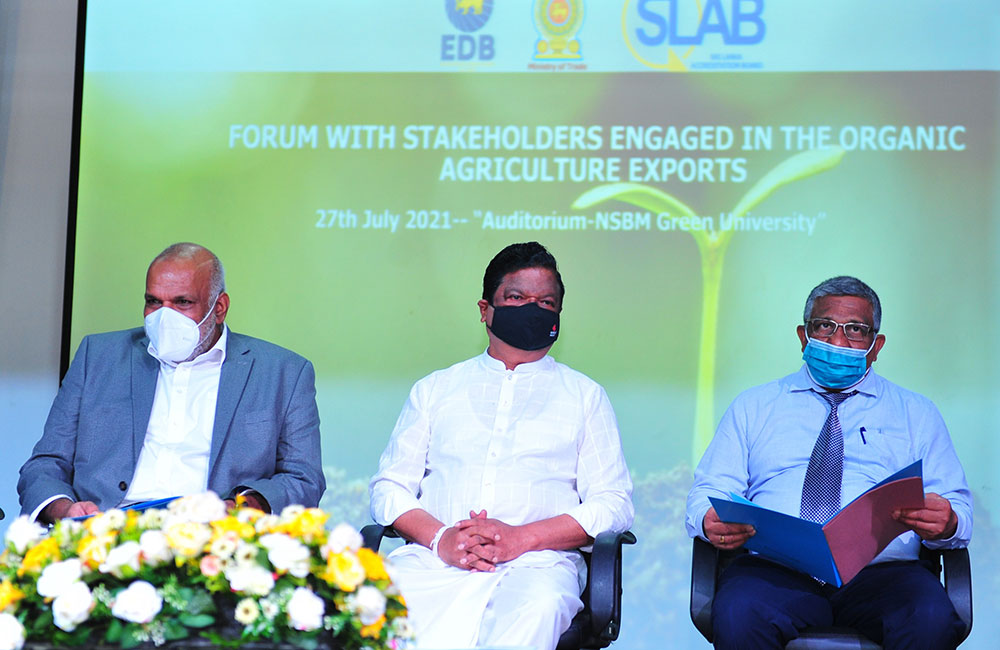
EDB conducts stakeholder forum on organic agricultural exports
Addressing the forum, Minister Gunawardena opined that a golden opportunity has arisen for Sri Lanka to solve its foreign exchange problems with the special emphasis President Gotabaya Rajapaksa has given to promote organic agricultural exports.
Commenting on the negative sentiments expressed by various parties about the Government’s plans to completely move away from chemical fertilisers, he pointed out such things are quite natural whenever a novel idea or concept is proposed.
“At the time I was Education Minister, I faced a lot of opposition when I proposed to establish a secondary school in Homagama. So called experts were claiming that it was not going to succeed. However, contrary to the pessimistic predictions of doomsayers and naysayers, Homagama Mahinda Rajapaksa College has today become one of the most sought after schools in the country, producing top results in A/L and O/L examinations. Hence, we must not get discouraged by the criticism of cynics," he said.
The Minister also said that plans are underway to establish a chain of retail chains selling organic food products – Sathosa Organic Supermarket – in twenty-five (25) main cities across the country including Colombo’, the Minister remarked.
Chairman of National Organic Control Unit (NOCU) Advisory Committee, Dr. Sarath Ranaweera providing an overview of the nation’s organic agricultural exports during the occasion, disclosed that nearly 400 companies and 30,000 producers are involved in organic agriculture currently with 60,000 hectares of land being used for cultivation.
“Even during COVID, supermarket shelves reserved for organic food items went empty in the USA, as people are becoming quite health-conscious during this day and age’, he noted.
Addressing the event, EDB Chairman Suresh de Mel observed that a huge demand is anticipated for Sri Lanka’s organic products and there is potential to earn high incomes from the sector.
A large number of exporters involved in organic agriculture took part in the forum. The absence of adequate accredited laboratory facilities for inspection and testing within the country and rejection of products due to cross contaminations were expressed as the main impediments that restrict the progress of the sector by the participants.
EDB Additional Director General – Development, Malani Baddegamage in her vote of thanks conveyed her appreciation towards the officials of the Ministry of Trade, Department of Agriculture, Department of Export Agriculture, SLAB, Sri Lanka Standards Institute, Industrial Technological Institute, National Science Foundation, and National Fertilizer Secretariat for their presence and active participation in the forum.
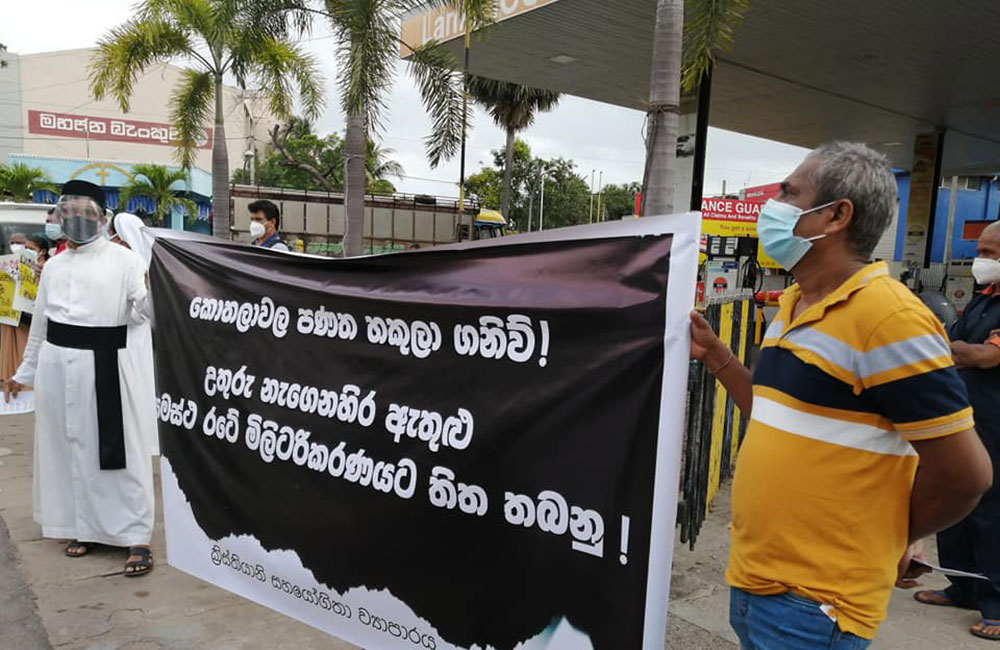
Protests in Negombo against militarisation of country
A protest had been staged in Negombo against militarisation of the entire country particularly in the north and east.
The protest, which was held in the Negombo city on Thursday (5) evening, had been organised by the Christian Solidarity Movement (CSM).
Activists displayed banners which read ‘withdraw Kotelawala Bill’ and ‘put an end to militarisation of the entire country including North and East’ as the protesters’ main slogans, and it included other slogans such as ‘we condemn arresting school principals, teachers and political activists’, ‘do not militarise education’, ‘do not lay a hand on free education’ and ‘let’s oppose militarisation.’
CSM had taken steps to hold the protest in accordance with safety measures such as wearing masks and maintaining social distancing.
Civil activists stated that a large number of police officers in uniform had been deployed to the venue of the protest.
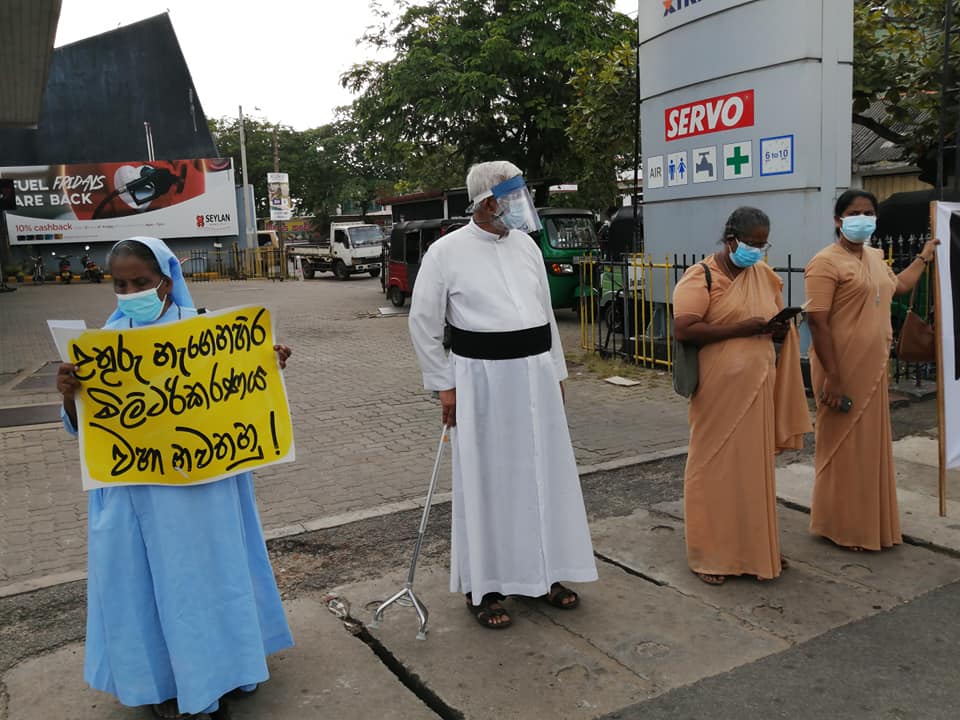

Kili Maharaja passes away

2543 more COVID-19 cases
The Epidemiology Unit of the Health Ministry reports that another 823 persons have tested positive for COVID-19 in Sri Lanka, moving the daily total of new cases to 2,543.
This brings the total number of confirmed cases of coronavirus reported in the country to 318,755.
The Epidemiology Unit’s data showed that 29,586 active cases are currently under medical care.
Meanwhile, Sri Lanka has registered 82 more COVID-19 related fatalities on Tuesday (August 03).
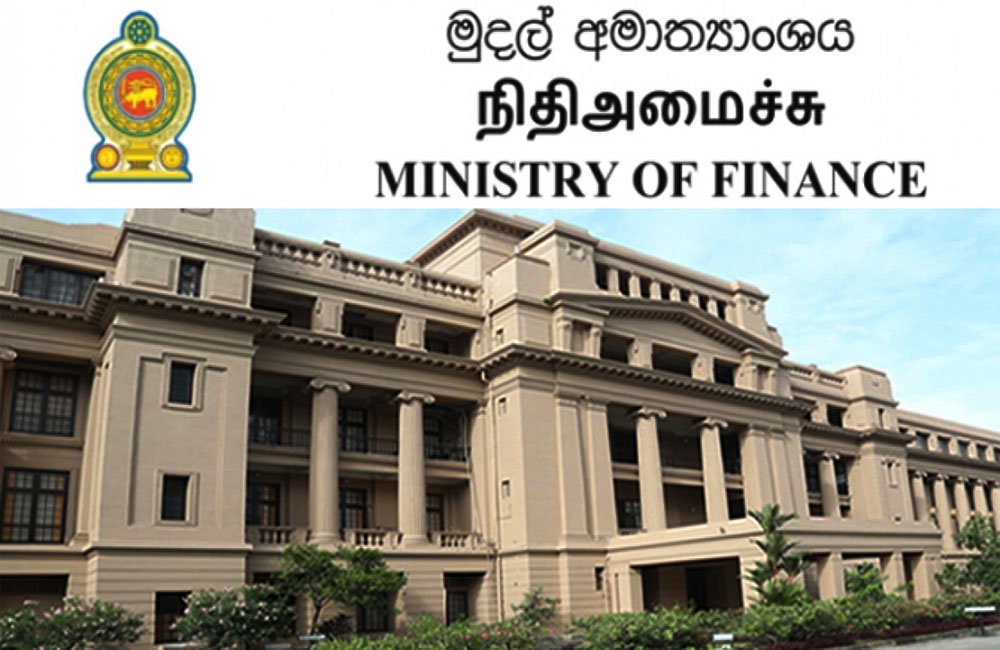
Finance Ministry imposes restrictions on state expenditure
Accordingly, it is reported that the Ministry of Finance has instructed all state institutions to immediately stop incurring additional expenses.
Meanwhile, the Ministry of Finance has instructed state institutions to halt recruiting new employees, the report said.
The Ministry of Finance has taken this step in view of the drastic reduction in government revenues with the spreading of coronavirus pandemic.
Meanwhile, Finance Minister Basil Rajapaksa has summoned all provincial governors and district secretaries to Temple Trees last week and instructed them to limit spending.
The Minister of Finance has instructed them to cut the additional expenses of government institutions and not to increase the number of employees.
Page 348 of 660